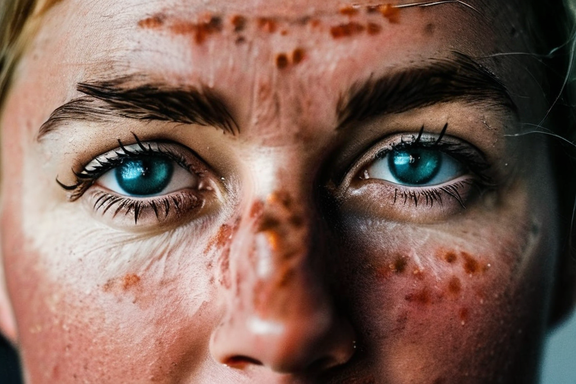Managing Adult Acne and Skin Changes: A Comprehensive Guide
Think of your once flawless complexion turning into an unexpected seventh continent at the age of 30 – a landscape of pimples. Worry not: it’s a common story. Rates of adult acne among men and women in their 30s to 40s are on the rise. What is the science of adult acne? What are the factors that lead to it? And what can you do to control and prevent it? The answers lie in the following pages.
Cracking The Adult Acne Code
Out with the myths: adult acne isn’t a malevolent spell, but rather a skin condition called acne vulgaris, which is estimated to affect 15 million people in the US. Generally assumed to be across the runway from adulthood, it’s something of a third wheel for many in their 20s and 30s.
The biology of acne
Acne is caused by a build-up of sebum (oil from the skin) beneath the skin that gets blocked from coming to the surface when the shedding of cells inside the follicle fails. This entrapment of sebum and bacteria leads to a breakout. Chocolates do not cause acne; hormonal change does. Hormones, notably testosterone, lead to an increase in sebum production and a change in the keratin that comes through the follicle.
The children suffer from acne vulgaris – and the adults with acne rosacea – which additionally shows up as red skin, inflamed, open pustules and red blood vessels, and often gets worse with stress – a reaction that can be similarly intensified by hormonal disturbances and stress responses in both groups.
Navigating the challenge is made easier by becoming aware of triggers such as hormones, stress, a bad diet, an excess of alcohol and cigarettes – all of which make adult acne worse. Being aware of the triggers means that you can be proactive in making positive lifestyle choices.
When it comes to conquest, adult acne is a different beast entirely: it can strike the face, neck, chest, back, shoulders, scalp and limbs, and it tends to infiltrate in a way that’s a little more insidious, given that we’ve been dealing with so many barricades to breakouts in the meantime. In addition to the awkwardness of being an adult with zits, our lingering acne erectus invites some tried-and-true adult hang-ups such as scarring and accelerated ageing – neither of which is a welcome companion when attempting to navigate the treacherous terrain of wrinkled skin (which tends, when it is ageing, to heal more slowly).
Action Points: Your Arsenal of Skin Care
Severe cases should be brought to your dermatologist. Prescribed meds by your doctor can be antibiotics or Isotretinoin. Keep it ‘non-comedogenic’ in your skin-care products, to avoid clogging your pores.
Stress Management to Reduce Acne Breakouts
Stress management can minimize flare-ups. Spend time on hobbies that take your mind off things, get faraway or go for a walk in nature. Time to relax and clear your mind.
Jean Kerr Courtesy Lioness Media
Beauty is in the eye of the beholder – and that eye’s view of your skin is just one opinion. You needn’t match the ideals set by aircraft smartphone screens to be loved and admired. Find clarity and health, then let your acne-filled face or your wrinkled, sagging skin grow with you as you make your way through the world.
Prepare yourself for the battle of adult acne with all the weapons you can get. Your path to self-assurance, appropriate skin for middle-age, and wellness has just begun.
Other topics that may interest you:
- Adult Acne: A Comprehensive Guide to Managing Skin Changes
- Clear Skin: Effective Acne Treatment Tips
- Treating Acne Scars: Causes, Prevention, and Solutions
- Acne Control the Natural Way: Effective Tips for Clear Skin
- Essential Vegetables in Your Acne Program
Questions and answers:
Can adults experience acne, or is it limited to teenagers?
While acne is most commonly found in young people, adults can also suffer from acne, known as adult acne, especially in people between the ages of 25 and 40.
What's the scientific term for common acne?
The medical term for common acne is ‘acne vulgaris’, the inflammation of the epidermis due to sebum (skin oil) and bacterial infection.
How does hormone imbalance contribute to adult acne?
Oestrogens and testosterone, when in a state of imbalance, can feed acne by creating excessive amounts of sebum, or by changing the type of keratin produced by the follicle.
Is there a connection between stress and adult acne?
Mm-hmm, yes, so stress can worsen adult acne; plus, when a person is stressed out, or in a stressful situation, their body’s stress responses can cause hormonal changes and hence their skin problems and breakouts.
Can diet and lifestyle impact adult acne?
Yes, diet, alcohol, smoking, and lifestyle choices can aggravate adult acne. Knowing triggers helps with managing the condition.
How can adults manage and treat their acne effectively?
In severe cases, it may be helpful to consult a dermatologist, but using non-comedogenic skin care products, working to control stress and experimenting with lifestyle changes are great foundations for a clear complexion.
Remember, though, that consulting a dermatologist is important to get individualised advice and treatment plans for successfully treating adult acne.



0 Comments